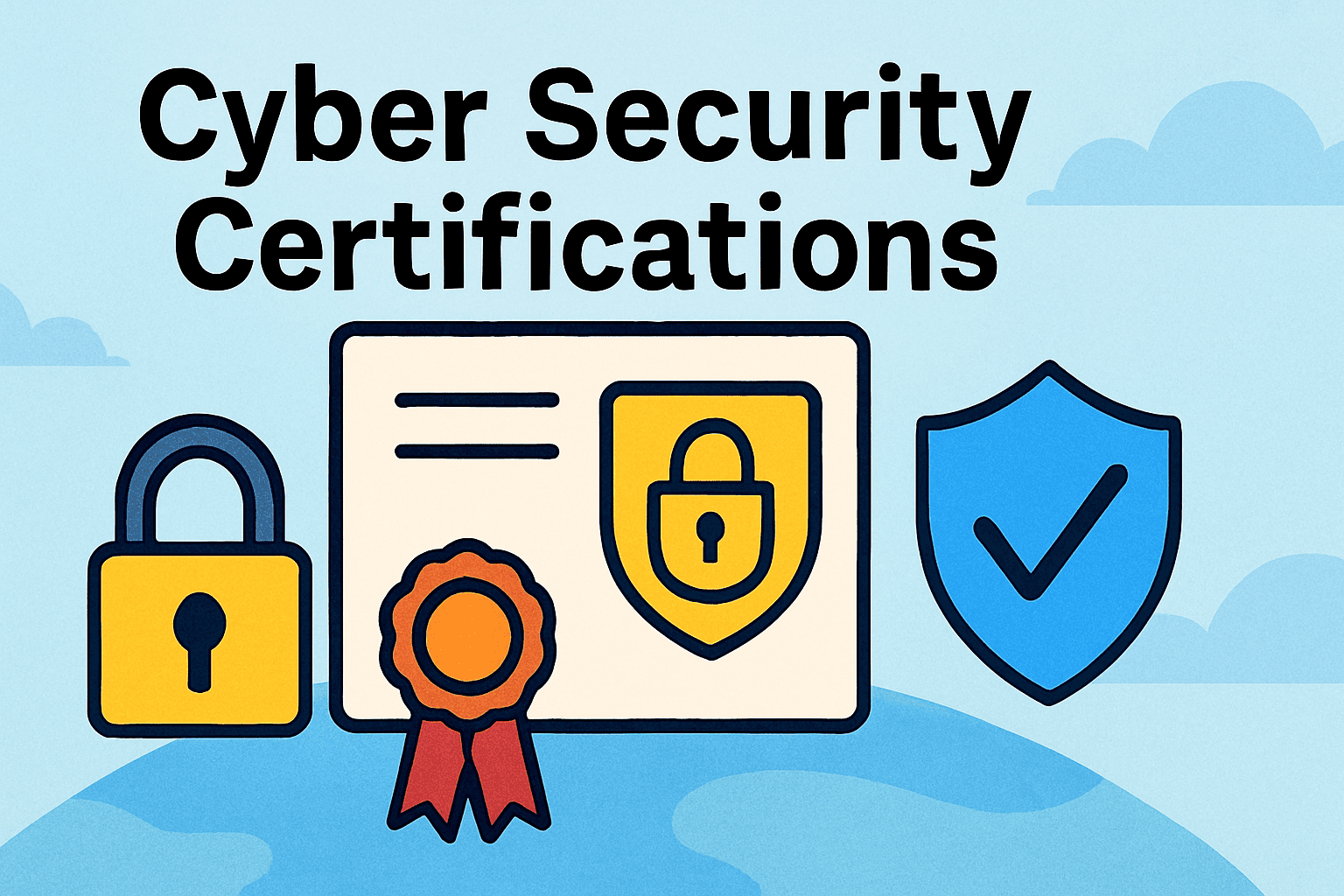Updated on September 30, 2025, by OpenEDR
With cybercrime damages expected to reach $10.5 trillion annually by 2025, the demand for skilled cybersecurity professionals has never been higher. But here’s the question every IT manager and aspiring security expert faces: which cyber security certifications are worth pursuing?
Cyber security certifications validate expertise, demonstrate credibility, and open doors to better job opportunities. Whether you’re an IT manager enhancing team skills or a CEO ensuring your staff meets compliance standards, certifications help bridge the gap between theory and practice.
In this guide, we’ll explore the best cyber security certifications, their benefits, career value, and how to choose the right one.
What Are Cyber Security Certifications?
Cyber security certifications are professional credentials that validate knowledge and skills in protecting IT systems, networks, and data from cyber threats.
They can cover areas such as:
Network security
Risk management & compliance
Penetration testing & ethical hacking
Cloud and endpoint security
Incident response & forensics
👉 In short: Cyber security certifications prove you have the expertise to defend businesses against evolving cyber risks.
Benefits of Cyber Security Certifications
So why invest time and money in certifications?
Career Growth – Certifications increase salary potential and promotion opportunities.
Industry Recognition – Credentials like CISSP and CEH are globally respected.
Compliance Assurance – Many industries require certified staff to meet regulatory standards (HIPAA, PCI DSS, GDPR).
Practical Skills – Certifications provide hands-on learning in real-world environments.
Organizational Trust – Businesses with certified staff gain customer confidence.
👉 According to a (ISC)² report, certified cybersecurity professionals earn up to 15% more than non-certified peers.
Top Cyber Security Certifications in 2025
When choosing a certification, consider your career stage, business needs, and specialization.
1. CompTIA Security+ (Beginner)
Great entry-level certification.
Covers basic security concepts, threats, and incident response.
Average Salary: $70,000–$85,000/year.
2. Certified Ethical Hacker (CEH) (Intermediate)
Focuses on penetration testing and ethical hacking.
Teaches how attackers think to build stronger defenses.
Average Salary: $95,000–$110,000/year.
3. Certified Information Systems Security Professional (CISSP) (Advanced)
Ideal for senior security managers and architects.
Covers access control, cryptography, and risk management.
Average Salary: $120,000–$150,000/year.
4. Certified Information Security Manager (CISM)
Management-focused certification.
Helps align security strategies with business goals.
Average Salary: $110,000–$140,000/year.
5. Certified Cloud Security Professional (CCSP)
Tailored for cloud security experts.
Focuses on SaaS, IaaS, and PaaS protection strategies.
Average Salary: $115,000–$135,000/year.
6. GIAC Security Essentials (GSEC)
Validates essential cybersecurity knowledge.
Hands-on, practical approach.
Average Salary: $90,000–$105,000/year.
Cyber Security Certifications by Career Level
Entry-Level Professionals
CompTIA Security+
Cisco’s CCNA Security
Microsoft Security Fundamentals
Mid-Career IT Managers
CEH
GSEC
Certified Information Systems Auditor (CISA)
Executives & Security Leaders
CISSP
CISM
CCSP
👉 Tip: Pair certifications with real-world tools like Endpoint Detection & Response (EDR) to stay ahead of threats.
Cyber Security Certifications vs Degrees
| Aspect | Certifications | Degrees |
|---|---|---|
| Duration | Weeks to months | 2–4 years |
| Cost | $300–$5,000 | $20,000–$50,000+ |
| Focus | Specific skills & tools | Broad IT/cybersecurity knowledge |
| Recognition | Globally recognized (CISSP, CEH) | Regionally accredited |
| Career Impact | Immediate practical value | Long-term academic credibility |
👉 Verdict: Certifications provide faster ROI for professionals and businesses, while degrees deliver broader foundations.
Costs of Cyber Security Certifications
Certification costs vary widely depending on the credential:
CompTIA Security+ – $370
CEH – $1,200–$1,500
CISSP – $749 exam + training fees
CISM – $760 exam
CCSP – $599 exam
👉 Businesses often cover certification costs for employees as part of cybersecurity training programs.
Choosing the Right Cyber Security Certification
When deciding, ask these key questions:
✅ What’s your career goal—technical specialist, manager, or executive?
✅ Which industry compliance standards does your company follow?
✅ Do you need a broad foundation or a specialized focus (e.g., cloud, forensics)?
✅ How much time and budget can you invest?
👉 Example: A healthcare IT manager may pursue CISSP for compliance-driven leadership, while a penetration tester benefits more from CEH.
Future Trends in Cyber Security Certifications
As threats evolve, so will certifications. Expect more focus on:
AI and Machine Learning Security
Zero Trust Architectures
IoT Security Certifications
Cloud-first security strategies
Incident Response & Digital Forensics
FAQs: Cyber Security Certifications
1. Which cybersecurity certification is best for beginners?
CompTIA Security+ is the most recommended starting point.
2. Do cybersecurity certifications expire?
Yes. Many require renewal every 2–3 years with continuing education credits.
3. Are cyber security certifications worth it?
Absolutely. They boost skills, credibility, and earning potential.
4. Is CISSP harder than CEH?
Yes. CISSP is broader and management-focused, while CEH is hands-on and technical.
5. Can small businesses benefit from staff certifications?
Yes. Certified employees strengthen security posture and ensure compliance.
Conclusion: Cyber Security Certifications as a Business Imperative
So, what are the best cyber security certifications? The answer depends on your role, goals, and industry. From Security+ for beginners to CISSP for executives, certifications empower professionals to stay competitive and help businesses defend against evolving threats.
But remember—certifications alone aren’t enough. The best defense combines certified expertise, layered security, and advanced tools like EDR for real-time threat detection and response.
👉 Strengthen your security posture today: Register for OpenEDR Free
